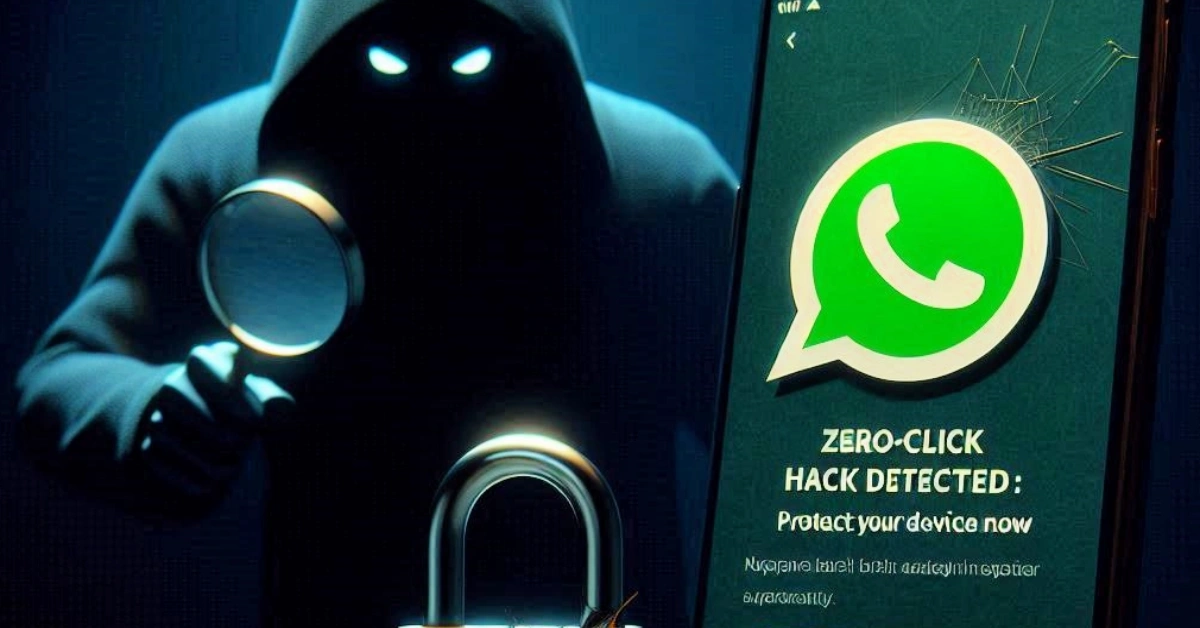In an era where communication has never been easier, the risks associated with it have never been higher. From AI-based phishing attacks targeting Gmail users to social media platforms becoming hotbeds for cyber threats, even the most secure devices and apps are not immune. Now, Meta has confirmed a zero-click hack targeting WhatsApp users, raising alarms for millions worldwide. Here’s everything you need to know about this sophisticated attack and how to stay safe.
Table of Contents
What is the WhatsApp Zero-Click Hack?
A zero-click hack is one of the most dangerous forms of cyberattacks because it requires no interaction from the victim. Unlike phishing scams that rely on users clicking malicious links or downloading infected files, zero-click attacks exploit vulnerabilities in software to infiltrate devices silently.
Meta has confirmed that WhatsApp, one of the world’s most popular secure messaging platforms, was targeted by such an attack. The hack was carried out using Graphite, a spyware developed by Israel-based Paragon Solutions. This spyware is comparable to the infamous Pegasus spyware created by the NSO Group, which has been used to target journalists, activists, and government officials.
UnitedHealth Data Breach Exposes 190 Million Americans: How to Protect Yourself from Identity Theft
Americans Can Claim Up to $6,000 for Data Breach Settlement – Are You Eligible?
Is Your Smartwatch Harming Your Health? The Hidden Dangers of PFAs in Fitness Trackers
Cash App Settlement 2025: Eligibility, Payout Per Person, and Everything You Need to Know
Who Was Targeted?
According to Meta, approximately 90 high-risk WhatsApp users were targeted in this attack. While the exact locations of these users remain undisclosed, it is believed they were spread across more than 20 countries. The victims included journalists and members of civil society, groups often targeted for their access to sensitive information.
Meta has already notified the affected users and issued a cease and desist letter to Paragon Solutions. The company is also exploring further legal actions against the spyware developer. Paragon Solutions has yet to comment on the allegations.
How Does Graphite Spyware Work?
Graphite is a highly sophisticated spyware capable of gaining full access to a compromised device. Once installed, it can:
- Read encrypted messages sent via apps like WhatsApp and Signal.
- Monitor calls, emails, and other communications.
- Track location and access sensitive files.
Stephanie Kirchgaessner, deputy head of investigations for The Guardian U.S., described Graphite as having capabilities “comparable to NSO Group’s Pegasus spyware.” This means the attackers can operate undetected, making it extremely difficult for victims to realize their devices have been compromised.
Why This Attack is a Wake-Up Call
While the average user is unlikely to encounter such advanced spyware, this attack highlights the growing sophistication of cyber threats. Adam Boynton, a senior security strategy manager at Jamf, noted that while fewer than 1% of workers experience mobile malware, the past 12–18 months have seen a significant increase in targeted attacks on mobile workers.
Boynton praised Meta for its transparency in notifying users about the attack, emphasizing that “encouraging transparency and the safe sharing of breach details will be critical to properly addressing the threat posed by spyware.”
How to Protect Yourself from Spyware Attacks
If you’re concerned about falling victim to a spyware attack like the one targeting WhatsApp, here are some actionable steps to safeguard your device:
1. Enable Lockdown Mode (For iPhone Users)
Lockdown Mode is a feature introduced by Apple to protect high-risk users from sophisticated cyberattacks. It disables certain functionalities to reduce the attack surface.
2. Keep Your Device Updated
Always ensure your device is running the latest version of its operating system. Software updates often include patches for security vulnerabilities that could be exploited by hackers.
3. Use Multi-Factor Authentication (MFA)
Adding an extra layer of security to your accounts can make it significantly harder for attackers to gain access.
4. Be Wary of Suspicious Messages
Even though zero-click attacks require no interaction, staying vigilant about unsolicited messages or links can help you avoid other types of malware.
5. Monitor Your Device for Unusual Activity
If your device suddenly starts behaving strangely—such as draining battery quickly, overheating, or running slowly—it could be a sign of spyware.
The Bigger Picture: Spyware and Cybersecurity
Spencer Starkey, an executive vice president at SonicWall, warned that “new attacks are being created at an unprecedented speed, making them more adaptive and difficult to detect.” This poses a significant challenge for cybersecurity professionals and underscores the need for constant vigilance.
Meta’s proactive response to this attack is a step in the right direction, but it also highlights the urgent need for global accountability for spyware companies. As Boynton pointed out, “spyware companies must be held accountable for their unlawful actions.”
$20 Million Apple Settlement Watch Battery Swelling Issues: Here’s How You Can Claim Your Share
BCBS Settlement Payout 2025: When and How You’ll Get Your Payment
PayPal Faces $2 Million Settlement Over 2022 Data Breach: What Went Wrong and What’s Next
BCBS $2.8 Billion Settlement: Who Can File a Claim and How to Get Your Share
Final Thoughts
The WhatsApp zero-click hack is a stark reminder that even the most secure platforms are not invincible. While the attack was highly targeted, it serves as a wake-up call for all users to take their digital security seriously. By enabling advanced security features, keeping devices updated, and staying informed about emerging threats, you can significantly reduce your risk of falling victim to such attacks.
Stay safe, stay vigilant, and remember: in the digital age, your security is in your hands.
